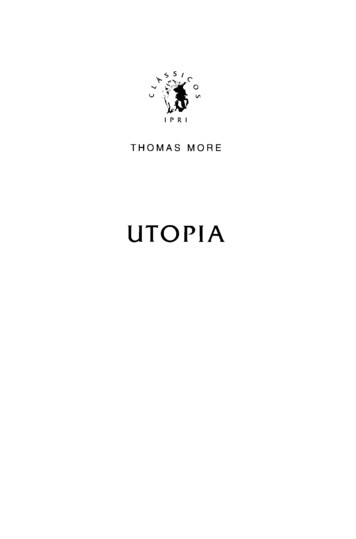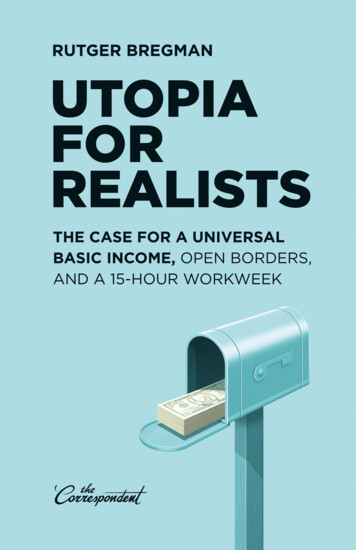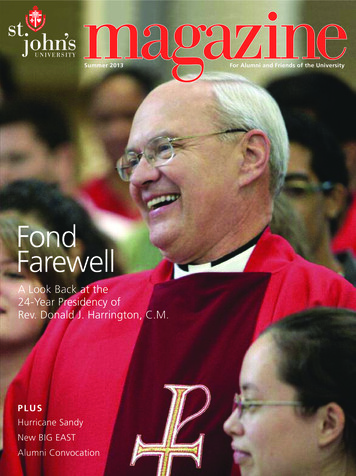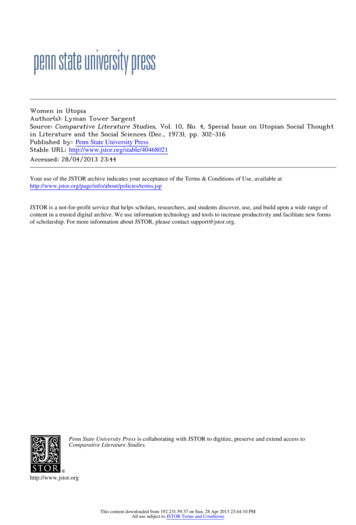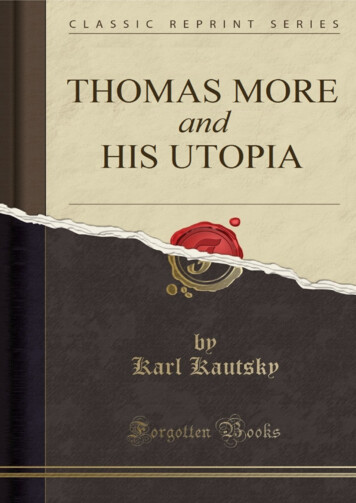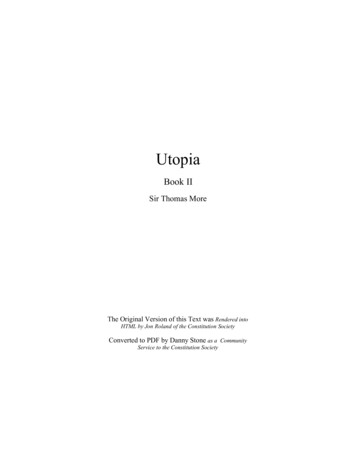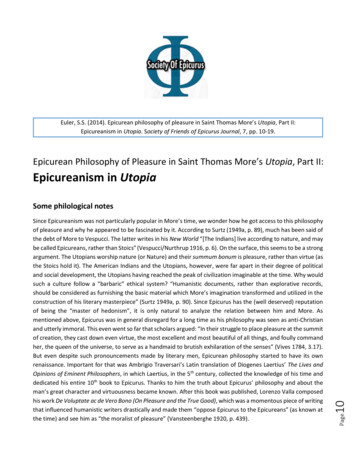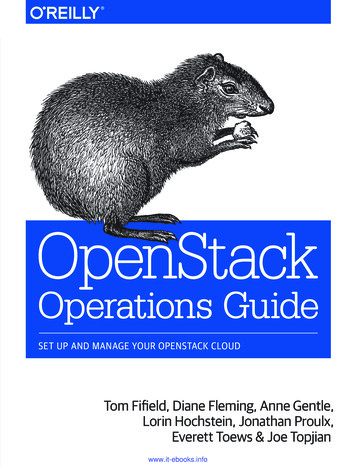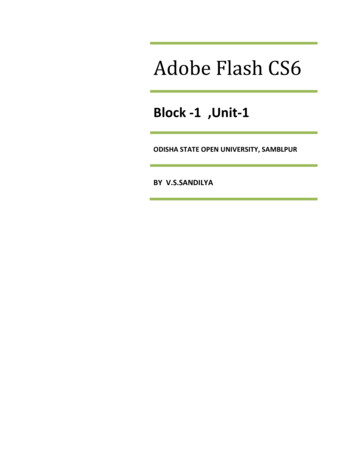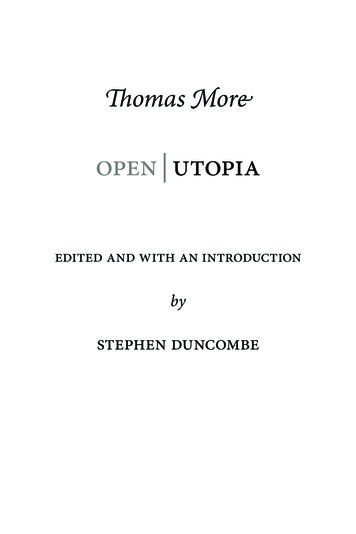
Transcription
Thomas Moreopen UtopiaEdited and with an IntroductionbyStephen Duncombe
Released by Minor Compositions 2012Wivenhoe / New York / Port WatsonMinor Compositions is a series of interventions and provocations drawing fromautonomous politics, avant-garde aesthetics, and the revolutions of everyday life.Minor Compositions is an imprint of Autonomediawww.minorcompositions.info minorcompositions@gmail.comisbn 978–1–57027–245–5Text designed and set in Minion by Charles PeytonDistributed by AutonomediaPO Box 568 Williamsburg StationBrooklyn, NY 11211This edition of Utopia is open: open to use, open to copying, open to modification.Open Utopia by Stephen Duncombe is licensed under a Creative CommonsAttribution-ShareAlike 3.0 Unported License. Permissions beyond the scope of thislicense may be available at tonomedia.org
contentsPreface Intellectual Commons vIntroduction Open Utopia ixUtopiaMap of Utopia 4Utopian Alphabet 5Four Verses in the Utopian Tongue 7A Short Meter of Utopia Anemolius 9Of Utopia Gerard Geldenhouwer 11To the Reader Cornelius Graphey 13Prefatory Epistle Thomas More to Peter Giles 15Book I 25Book II 81Thomas More to Peter Giles 195Erasmus to John Froben 199Peter Giles to Jerome de Busleyden 201Guillaume Budé to Thomas Lupset 207Jerome de Busleyden to Thomas More 219John Desmarais to Peter Giles 225Beatus Rhenanus to Willibald Pirckheimer 229Cast of Contributors 233Sources 235Acknowledgements 241
Intellectual Commons. . . in Utopia, where every man has a right to everything,they all know that if care is taken to keep the publicstores full no private man can want anything . . .Thomas More, UtopiaDoes the world really need another edition of Thomas More’sUtopia? Kept in print more or less continuously since it was firstpublished in 1516, the translations and editions of this book, not tomention the scholarly interpretations and academic dissertations basedupon this slender volume, would likely constitute the mass of a mediumsized island in themselves. It takes a bit of audacity to introduce yetanother version of Utopia. Yet I have done so here because what theworld does not have, and what I believe it needs, is a complete Englishlanguage translation of Utopia that honors the primary precept ofUtopia itself — that is, that all property is common property.This edition of Utopia is open: open to read, open to copying, opento modification. Open Utopia is assembled from translations andeditions of More’s Utopia that are in the public domain. The Preface,Introduction and footnotes, written by me, are licensed under CreativeCommons, as are the few new translations I commissioned especiallyv
open utopiafor this volume. The Creative Commons “by-sa” license allows users touse, study, copy, share, and modify the work freely, as long as attributionis given and the content remains free to share. (The complete ancestryof Open Utopia can be found under “sources.”)Open Utopia is a complete edition, meaning that I have included allof the letters and commendations, as well as the marginal notes, thatwere included in the first four printings of 1516–18 in which Morehimself had a hand. Non-scholarly editions of the book often omit thismaterial, but I believe these letters and notes, written by the authorand his friends among the European literati, are essential for understanding what More was doing in and with his Utopia. (The first-timereader, however, can comfortably skip ahead to Book I and Book IIfirst, backtrack through the letters More wrote to Peter Giles that lieon either side, and then wander at their leisure through the other letters, commendations, and marginal notes.) I have also supplied a cast ofcontributors and copious footnotes of my own — not to bog the readerdown with the intricacies of academic debates, but to give historical,literary, and etymological context, providing the twenty-first-centuryreader with the information that More’s learned sixteenth-centuryaudience was likely to know.This paper-and-ink book is only a part of a larger project. Using primarily open-source software, I have created the Open Utopia website.On this site I have presented Utopia in different formats in order toenhance its openness. If the visitor wishes to read Utopia online, theycan. If they want to download and copy a version, I have supplied linksto do so in different formats for different devices. In partnership withthe Institute for the Future of the Book, I have provided an annotatableand “social” text available for visitors to comment upon what More — orI — have written, and then share their comments with others. Thosevi
prefacewho like to listen will find a reading of Utopia in audio format, andthose who prefer to watch and look can browse the user-generated galleries of Utopia-themed art and videos. For people interested in creating their own plan of an alternative society, I have created Wikitopia,a wiki with which to collaborate with others in drafting a new Utopia.More versions for more platforms are likely to be introduced in thefuture. Please visit the Open Utopia website at theopenutopia.org.Thomas More’s Utopia is more than the story of a far-off land wherethere is no private property. It is a text that instructs us how to approachtexts, be they literary or political, in an open manner: open to criticism,open to participation, open to modification, and open to re-creation. Ihave done my best with Open Utopia to convey this message and continue the tradition.Onward to Utopia!Stephen DuncombeNo-Place, 2012vii
open utopiaToday we are people who know better, andthat’s both a wonderful and terrible thing.Sam Green, Utopia in Four MovementsUtopia is a hard sell in the twenty-first century. Today we are peoplewho know better, and what we know are the horrors of “actuallyexisting” Utopias of the previous century: Nazi Germany, Stalin’s SovietUnion, Maoist China, and so on in depressing repetition.1 In each casethere was a radical break with the present and a bold leap toward animagined future; in every case the result was disastrous in terms ofhuman cost. Thankfully, what seems to be equally consistent is thatthese Utopias were relatively short-lived. History, therefore, appears toprove two things: one, Utopias, once politically realized, are staggeringin their brutality; and two, they are destined to fail. Not exactly a ringingendorsement.Yet we need Utopia more than ever. We live in a time without alternatives, at “the end of history” as Frances Fukuyama would have it, whenneoliberal capitalism reins triumphant and uncontested.2 There are stillaberrations: radical Islam in the East, neo-fascist xenophobia in the West,ix
open utopiaand a smattering of socialist societies struggling around the globe, but byand large the only game in town is the global free market. In itself thismight not be so bad, except for the increasingly obvious fact that thesystem is not working, not for most people and not most of the time.Income inequality has increased dramatically both between and withinnations. National autonomy has become subservient to the imperativesof global economic institutions, and federal, state, and local governanceare undermined by the protected power of money. Profit-driven industrialization and the headlong rush toward universal consumerism ishastening the ecological destruction of the planet. In short: the worldis a mess. Opinion polls, street protests, and volatile voting patternsdemonstrate widespread dissatisfaction with the current system, but thepopular response so far has largely been limited to the angry outcry ofNo! No to dictators, No to corruption, No to finance capital, No to theone percent who control everything. But negation, by itself, affects nothing. The dominant system dominates not because people agree with it; itrules because we are convinced there is no alternative.Utopia offers us a glimpse of an alternative. Utopia, broadly conceived,is an image of a world not yet in existence that is different from and betterthan the world we inhabit now. For the revolutionary, Utopia offers a goalto reach and a vision to be realized. For the reformer, it provides a compass point to determine what direction to move toward and a measuringstick to determine how far one has come. Utopia is politically necessaryeven for those who do not desire an alternative society at all. Thoughtful politics depend upon debate, and without someone or something todisagree with there is no meaningful dialogue, only an echo chamber.Utopia offers this “other,” an interlocutor with which to argue, therebyclarifying and strengthening your own ideas and ideals (even if theylead to the conclusion that Utopia is undesirable). Without a vision of anx
introductionalternative future, we can only look backwards nostalgically to the past,or unthinkingly maintain what we have, mired in the unholy apocalypsethat is now. Politically, we need Utopia.Yet there are theoretical as well as practical problems with the project.Even before the disastrous realizations of Utopia in the twentieth century, the notion of an idealized society was attacked by both radicals andconservatives. From the Left, Karl Marx and Frederick Engels famouslycriticized Utopians for ignoring the material conditions of the presentin favor of fantasies of a future—an approach, in their estimation, thatwas bound to result in ungrounded and ineffectual political programs,a reactionary retreat to an idealized past, and to inevitable failure andpolitical disenchantment. “Ultimately,” they wrote in The CommunistManifesto, “when stubborn facts had dispersed all intoxicating effectsof self-deception, this form of socialism end[s] in a miserable fit of theblues.” 3 That is to say, the high of Utopianism leads, inevitably, to thecrushing low of a hangover. From the Right, Edmund Burke disparaged the Utopianism of the French Revolution for refusing to take intoaccount the realities of human nature and the accumulated wisdom oflong-seated traditions. With some justification, Burke felt that such leapsinto the unknown could lead only to chaos and barbarism.4 Diametricallyopposed in nearly every other facet of political ideology, these lions of theLeft and Right could agree on one thing: Utopia was a bad idea.Between the two poles of the political spectrum, for those in thecenter who simply hold on to the ideal of democracy, Utopia can also beproblematic. Democracy is a system in which ordinary people determine,directly or through representation, the system that governs the societythey live within. Utopias, however, are usually the products of singularimaginations or, at best, the plans of a small group: a political vanguardor artistic avant-garde. Utopians too often consider people as organicxi
open utopiamaterial to be shaped, not as willful agents who do the shaping; the roleof the populace is, at best, to conform to a plan of a world already delivered complete. Considered a different way, Utopia is a closed programin which action is circumscribed by an algorithm coded by the masterprogrammer. In this program there is no space for the citizen hacker.This is one reason why large-scale Utopias, made manifest, are so horrificand short-lived: short-lived because people tend not to be so pliable, andtherefore insist on upsetting the perfect plans for living; horrific becausepeople are made pliable and forced to fit the plans made for them.5 InUtopia the demos is designed, not consulted.It is precisely the imaginative quality of Utopia—that is, the singular dream of a phantasmagorical alternative—that seems to damn theproject to naïve impracticality as an ideal and megalomaniac brutality inits realization. But without political illusions, with what are we left? Disillusion, and its attendant discursive practice: criticism.6 Earnest, ironic,sly, or bombastic; analytic, artistic, textual, or performative; criticismhas become the predominant political practice of intellectuals, artists,and even activists who are dissatisfied with the world of the present, andostensibly desire something new. Criticism is also Utopia’s antithesis. IfUtopianism is the act of imagining what is new, criticism, derived fromthe Greek words kritikos (to judge) and perhaps more revealing, krinein(to separate or divide), is the practice of pulling apart, examining, andjudging that which already exists.One of the political advantages of criticism—and one of the reasonswhy it has become the preferred mode of political discourse in the wakeof twentieth-century Utopian totalitarianism—is that it guards againstthe monstrous horrors of political idealism put into practice. If Utopian ism is about sweeping plans, criticism is about pointed objections. Theact of criticism continually undermines any attempt to project a perfectxii
introductionsystem. Indeed, the very act of criticism is a strike against perfection:implicitly, it insists that there is always more to be done. Criticism alsoasks for input from others. It presupposes a dialogue between the criticand who or what they are criticizing—or, ideally, a conversation amongmany people, each with their own opinion. And because the need to criticize is never-ending (one can always criticize the criticism itself), politicsremains fluid and open: a permanent revolution. This idea and ideal ofan endless critical conversation is at the center of democratic politics, foronce the conversation stops we are left with a monolithic ideal, and theonly politics that is left is policing: ensuring obedience and drawing thelines between those who are part of the brave new world and those whoare not.7 This “policing” is the essence of totalitarianism, and over thelast century the good fight against systems of oppression, be they fascist,communist or capitalist, has been waged with ruthless criticism.But criticism has run its political course. What was once a potentweapon against totalitarianism has become an empty ritual, ineffectualat best and self-delusional at worst. What happened? History. The powerof criticism is based on two assumptions: first, that there is an intrinsicpower and worth in knowing or revealing the Truth; and second, that inorder to reveal the Truth, belief—often based in superstition, propaganda,and lies—must be debunked. Both these assumptions, however, havebeen undermined by relatively recent material and ideological changes.The idea that there is a power in knowing the truth is an old one. Asthe Bible tells us in the Gospel of John (8:31–33), “And ye shall know thetruth, and the truth shall make you free.”8 What constituted “the truth”at that time was hardly the empirical fact of today—it was what we mightcall the supreme imaginary of the Word of God, communicated throughthe teachings of Jesus Christ. Nonetheless, these are the seeds of an ideaand ideal that knowing the answer to life’s mysteries is an intrinsic good.xiii
open utopiaAs I have argued elsewhere,9 this faith in the power of the Truth is integralto all modern political thought and liberal-democratic politics, but it isgiven one of its purest popular expressions in Hans Christian Anderson’s1837 tale, “The Emperor’s New Clothes.” The story, as you may recallfrom your childhood, is about an emperor who is tricked into buying aspectacular suit of non-existent clothing by a pair of charlatans posingas tailors. Eager to show it off, the Emperor parades through town in thebuff as the crowd admires his imaginary attire. Then, from the sidelines,a young boy cries out: “But he has nothing on,” and, upon hearing thisundeniable fact, the people whisper it mouth to ear, awaken from theirillusion, and live happily ever after. Is this not the primal fantasy of allcritics: that if they just reveal the Truth, the scales will fall from people’seyes and all will see the world as it really is? (Which, of course, is theworld as the critic sees it.)There was once a certain logic to this faith in the power of the possession of Truth—or, through criticism, the revealing of a lie. Within aninformation economy where there is a scarcity of knowledge, and oftena monopoly on its production and distribution, knowledge does equalpower. To criticize the official Truth was to strike a blow at church ofstate’s monopoly over meaning. Critique was a decidedly political act,and the amount of effort spent by church and state in acts of censorshipsuggests its political efficacy. But we do not exist in this world anymore.We live in what philosopher Jean-François Lyotard named “the postmodern condition,” marked by the “death of the master narrative,” inwhich Truth (or the not so Noble Lie) no longer speaks in one voice orresides in one location.10The postmodern condition, once merely an academic hypothesis pondered by an intellectual elite, is now, in the Internet age, the lived experience of the multitude. On any social or political issue there are hundreds,xiv
introductionthousands, even millions of truths being claimed. There are currently 1trillion unique URLs on the World Wide Web, accessed by 2 billion Googlesearches a day. There are more than 70 million videos posted on YouTube,and about 30 billion tweets have been sent. The worldwide count of blogsalone exceeds 130 million, each with a personalized perspective and mostmaking idiosyncratic claims.11 Even the great modern gatekeepers of theTruth—the BBC, CNN, and other “objective” news outlets—have beenforced to include user-generated content and comment boards on theirsites, with the result that no singular fact or opinion stands alone orremains unchallenged.It was the great Enlightenment invention of the Encyclopedia that dem ocratized Truth—but only in relation to its reception. Wikipedia, the onlineencyclopedia with its 3.5 million-and-counting entries in English alonehas democratized the production of truths.12 This process is not something hidden, but is part of the presentation itself. Each Wikipedia pageis headed by a series of tabs that, when clicked, display the encyclopediaentry itself, public discussion about the definition provided, the historyof the entry’s production, and a final tab, “edit this page,” where a readerhas the chance to become a (co)producer of knowledge by editing andrewriting the original entry. In Wikipedia the Truth is transformed fromsomething that is into something that is becoming: built, transformed,and revised; never stable and always fluid: truth with a small “t.”Today’s informational economy is no longer one of monopoly orscarcity—it is an abundance of truth . . . and of critique. When poweris wielded through a monopoly on Truth, then a critical assault makes acertain political sense, but singularity has now been replaced by plurality.There is no longer a communications citadel to be attacked and silenced,only an endless plain of chatter, and the idea of criticizing a solitary Truth,or swapping one for the other—the Emperor wears clothes/the Emperorxv
open utopiawears no clothes—has become increasingly meaningless. As the objectsof criticism multiply, criticism’s power and effect directly diminish.Criticism is also contingent upon belief. We often think of belief asthat which is immune to critique. It is the individual or group that isabsolutely confident—religious fundamentalists in today’s world, ortotalitarian communists or fascists of the last century; that is, those whopossess what we call blind belief, which criticism cannot touch. This isnot so, for it is only for those who truly believe that criticism still matters.Criticism threatens to undermine the very foundation of existence forthose who build their lives on the edifice of belief. To question, and thusentertain doubt, undermines the certainty necessary for thoroughgoingbelief. This is why those with such fervent beliefs are so hell-bent on suppressing their critics.But can one say, in most of the world today, that anyone consciouslybelieves in “the system”? Look, for instance, at the citizens of the UnitedStates and their opinions about their economic system. In 2009, the majorUS pollster Rasmussen Reports stated that only a marginal majority ofAmericans—53 percent—believe that capitalism is a better system thansocialism.13 This finding was mirrored by a poll conducted a year later bythe widely respected Pew Research Center for the People and the Press,in which only 52 percent of Americans expressed a favorable opinion ofcapitalism.14 Just a reminder: these polls were taken after the fall of theSoviet Union and the capitalist transformation of China, in a countrywith no anti-capitalist party, where the mass media lauds the free marketand suggests no alternatives, and where anti-communism was raised toan art form. This lack of faith in the dominant system of capitalism ismirrored worldwide. A BBC World Service poll, also from 2009, foundthat across twenty-seven (capitalist) countries, only 11 percent of thepublic thought free-market capitalism was working well. Asked if theyxvi
introductionthought that capitalism “is fatally flawed and a different economic systemis needed,” 23 percent of the 29,000 people surveyed answered in theaffirmative, with the proportion of discontents growing to 35 percent inBrazil, 38 percent in Mexico, and 43 percent in France.15My anti-capitalist friends are thrilled with these reports. Surely we’rewaiting for the Great Leap Forward. I hate to remind them, however, thatif the system is firmly in control, it no longer needs belief: it functions onroutine . . . and the absence of imagination. That is to say, when ideologybecomes truly hegemonic, you no longer need to believe. The reigning ideology is everything: the sun, the moon, the stars; there is simply nothingoutside—no alternative—to imagine.16 Citizens no longer need to believein or desire capitalism in order to go along with it, and dissatisfaction withthe system, as long as it is leveled as a critique of the system rather thanproviding an alternative, matters little. Indeed, criticism of neoliberalcapitalism is a part of the system itself—not as a healthy check on poweras many critics might like to believe, but as a demonstration of the sort ofplurality necessary in a democratic age for complete hegemonic control.I am reminded of the massive protests that flooded the streets beforethe US invasion of Iraq. On February 15, 2003 more than a millionpeople marched in New York City, while nearly 10 million demonstratedworldwide. What was the response of then president George W. Bush?He calmly and publicly acknowledged the mass demonstration as a signthat the system was working, saying, “Democracy’s a beautiful thing . . .people are allowed to express their opinion, and I welcome people’s rightto say what they believe.”17 This was spin and reframing, but it got at afundamental truth. Bush needed the protest to make his case for a warof (Western) freedom and liberty versus (Arab) repression and intolerance. Ironically, he also needed the protest to legitimize the war itself. Inthe modern imagination real wars always have dissent; now that Bushxvii
open utopiahad a protest, he had a genuine war. Although it pains me to admit this,especially as I helped organize the demonstration in New York, anti-warprotest and critique has become an integral part of war.When a system no longer needs to base its legitimacy on the consciousbelief of its subjects—indeed, no longer has to legitimize itself at all—thecritical move to debunk belief by revealing it as something based on liesno longer retains its intended political effect. This perspective is not universally recognized, as is confirmed by a quick perusal of oppositionalperiodicals, be they liberal or conservative. In each venue there will becriticisms of official truth and the positing of counter-truths. In eachthere exist a thousand young boys yelling out: “But he has no clothes!” Tono avail. The debunking of belief may continue for eternity as a tired andimpotent ritual of political subjectivity—something to make us thinkand feel as if we are really challenging power—but its efficacy is nil.Dystopia, Utopia’s doppelganger, speaks directly to the crisis in belief,for dystopias conjure up a world in which no one wants to believe. LikeUtopias, dystopias are an image of an alternative world, but here the similarities end. Dystopian imaginaries, while positing a scenario set in thefuture, always return to the present with a critical impulse—suggestingwhat must be curtailed if the world is not to end up the way it is portrayed.Dystopia is therefore less an imagination of what might be than a revealing of the hidden logic of what already is. Confronted with a vision of ourhorrific future, dystopia’s audience is supposed to see the Truth—that ourpresent course is leading us to the rocks of disaster—and, having wokenup, now act. Dystopic faith in revelation and the power of the (hidden)truth makes common cause with traditional criticism, and suffers thesame liabilities.Furthermore, the political response generated by dystopia is always aconservative one: stop the so-called progress of civilization in its coursexviii
introductionand . . . and what? Where do we go from here? We do not know becausewe have neither been offered a vision of a world to hope for nor encouraged to believe that things could get better. In this way dystopias, evenas they are often products of fertile imagination, deter imagination inothers. The two options presented to the audience are either to accept thedystopic future as it is represented, or turn back to the present and keepthis future from happening. In neither case is there a place for imagininga desirable alternative.Finally, the desire encouraged through dystopic spectatorship is perverse. We seem to derive great satisfaction from vicariously experiencingour world destroyed by totalitarian politics, rapacious capitalism, runaway technology, or ecological disaster; and dystopic scenarios—1984,Brave New World, Blade Runner, The Day After Tomorrow, The Matrix,2012—have proved far more popular in our times than any comparableUtopic text. Contemplating the haunting beauty of dystopic art, likeRobert Graves and Didier Madoc-Jones’s recent “London Futures” showat the Museum of London in which the capital of England lies serenelyunder seven meters of water,18 brings to mind the famous phrase of WalterBenjamin, that our “self-alienation has reached such a degree that it canexperience its own destruction as an aesthetic pleasure of the first order.” 19While such dystopic visions are, no doubt, sincerely created to instigatecollective action, I suspect what they really inspire is a sort of solitarysatisfaction in hopelessness. In recent years a new word has entered ourvocabulary to describe this very effect: “disasterbation.” 20So here we are, stuck between the Devil and the deep blue sea, with adecision to make. Either we drift about, leveling critiques with no criticaleffect and reveling in images of our impending destruction—living a lifeof political bad faith as we desire to make a difference yet do not—orwe approach the Devil. It is not much of a choice. If we want to changexix
open utopiathe world, we need to abandon the political project of pure criticism andstrike out in a new direction. That is, we need to make our peace withUtopia. This cannot happen by pretending that Utopia’s demons do notexist—creating a Utopia of Utopia; instead it means candidly acknowledging the problems with Utopia, and then deciding whether the ideal isstill salvageable. This revaluation is essential, as it is one thing to concludethat criticism is politically impotent, but quite another to suggest that, inthe long shadow of its horrors, we resurrect the project of Utopianism.“Today we are people who know better, and that’s both a wonderfuland terrible thing.”21 When Sam Green presents this line in his performance of Utopia in Four Movements it is meant as a sort of lament thatour knowledge of Utopia’s horrors cannot allow us ever again to havesuch grand dreams. This knowledge is wonderful in that there will beno large-scale atrocities in the name of idealism; it is terrible in that weno longer have the capacity to envision an alternative. But we needn’tbe so pessimistic; perhaps “knowing better” offers us a perspective fromwhich we can re-examine and re-approach the idea and ideal of Utopia.“Knowing better” allows us to ask questions that are essential if Utopia isto be a viable political project.The paramount question, I believe, is whether or not Utopia canbe opened up — to criticism, to participation, to modification, and tore-creation.22 It is only a Utopia like this that will be resistant to theills that have plagued the project: its elite envisioning, its single-mindedexecution, and its unyielding manifestation. An Open Utopia that isdemocratic in its conception and protean in its realization gives us achance to escape the nightmare of history and start imagining anew.Another question must also be addressed: How is Utopia to comeabout? Utopia as a philosophical ideal or a literary text entails no inputother than that of its author, and no commitment other than time andxx
introductioninterest on the part of its readers; but Utopia as the basis of an alternativesociety requires the participation of its population. In the past peoplewere forced to accept plans for an alternative society, but this is the pastwe are trying to escape. If we reject the anti-democratic, politics-fromabove model that has haunted past Utopias, can the public be persuadedto ponder such radical alternatives themselves? In short, now that “weare people who know better,” can we be convinced to give Utopia anotherchance?These are vexing questions. Their answers, however, have been thereall along, from the very beginning, in Thomas More’s Utopia.When More wrote Utopia, in the early sixteenth century, he was notthe first writer to have imagined a better world. T
Thomas More’s Utopia is more than the story of a far-off land where there is no private property. It is a text that instructs us how to approach texts, be they literary or political, in an open manner: open to criticism, open to partic

